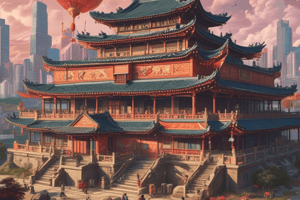Podcast
Questions and Answers
Which of the following is NOT a characteristic of postmodern art and architecture?
Which of the following is NOT a characteristic of postmodern art and architecture?
- Challenging the principles of modernism
- Using pastiche or mimicry of past cultural styles
- Emphasizing functionalism and rationalism (correct)
- Using traditional and modern elements together
What is the main form of energy produced in postmodern society?
What is the main form of energy produced in postmodern society?
- Solar energy
- Wind energy
- Electric energy
- Nuclear energy (correct)
What is simulation in postmodern culture and technology?
What is simulation in postmodern culture and technology?
- The use of pastiche in artwork
- The disappearance of distinctions between 'true' and 'false' (correct)
- The distinction between 'true' and 'false'
- The challenge of modern art and architecture principles
Flashcards are hidden until you start studying
Study Notes
Postmodernism in Culture and Arts
- "Postmodern" refers to a cultural period and attitude that followed the modern period and often criticized its basic features and assumptions.
- The postmodern movement in architecture began as a criticism of modernist principles and used modern and traditional elements together.
- Postmodern artists often challenged the basic principles of modern art and architecture, such as functionalism and rationalism.
- Pastiche, or mimicry of past cultural styles, is a major postmodern cultural style used in architecture, music, literature, and films.
- The original is often demolished in postmodern artwork, and pastiche images are called simulacra.
- Consumerism is a fundamental feature of postmodern economy and society, where all production is destined for consumption of items that are not considered necessary.
- Multinational companies govern the postmodern economy, operating beyond national borders with production sites all over the world.
- Electric and nuclear energy are the main forms of energy produced in postmodern society, with electric energy increasingly dominant in microelectronics.
- The computer is the dominant technology of postmodern society and can be seen as an exteriorization of the brain.
- Simulation is a fundamental feature of postmodern culture and technology, resulting in the disappearance of distinctions between 'true' and 'false'.
- Simulation can be applied in various spheres of social life, culture, and technology, such as pilot training, genetic engineering, production of robots, and artificial intelligence.
- Andy Warhol's postmodern painting of shoes appears as a depthless, flat surface that refers to another image, not an outside reality, in contrast to Van Gogh's shoes, which are worn and old and appear as part of a whole way of living.
Studying That Suits You
Use AI to generate personalized quizzes and flashcards to suit your learning preferences.




